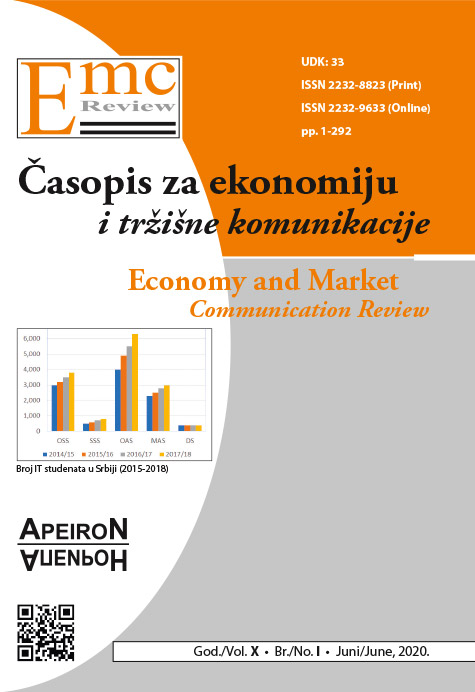Forecast of E-Commerce Growth in Bosnia and Hercegovina
DOI:
https://doi.org/10.7251/EMC2001151JAbstract
E-commerce is growing faster than traditional forms of commerce. The expansion of the internet, mobile networks and the use of smartphones have increasingly driven consumers to online shopping. The convenience of buying from home and possibilities to compare products are key benefits for consumers. Changes in consumer behavior have implications for traders and their business models. They are switching the entire business to e-commerce. The relatively lower costs of doing business and promotional activities are key reasons for such business transitions. For traditional traders (Brick and mortar), the greater challenge is that big players in this sector become those who do not have physical stores. The implementation and expansion of e-commerce are of varying intensity in the economies of the world. E-commerce can significantly increase competitiveness and strengthen the position of B&H companies in a wider market. This paper deals with the current and future trends of e-commerce in Bosnia and Herzegovina. The paper forecasts e-commerce trends for the period from 2019 to 2021. Based on available data for the period from 2015 to 2018, by the trend extrapolation method, the forecast for the next three years is given. A trend represents the movement of a process or occurrence that prevails over some time. The business activity under code 47.91 was analyzed, that is, retail trade via mail or internet. Business activity under code 47.91 is compared with the same at global and Europian level. Besides, basic business performance was analyzed both at the level of activity 47.91 and at the level of five domestic e-commerce companies (Pik d.o.o., E-kupi d.o.o., Kupi tehniku d.o.o., Fact cool d.o.o. i Dopi grupa d.o.o.). The following indicators were used in the analysis of business performance: sales revenue, net profit, number of employees and return on total assets. The paper aims to identify the growth rates of e-commerce in the period 2015-2018 in this market, to determine what this trend is relative to the trend of e-commerce development in the world and the region. Further, the aim is to extrapolate the trends of the analyzed indicators to predict the growth of e-commerce in Bosnia and Herzegovina in the next three years.Based on an extrapolation of trends in sales revenue, net income, and headcount, it was concluded that the growth rate of e-commerce in BiH will be significantly lower compared to the global level, but should also be higher than the growth at the level of European Union. Research has shown that e-commerce is very profitable and that an increasing number of companies are joining it.
